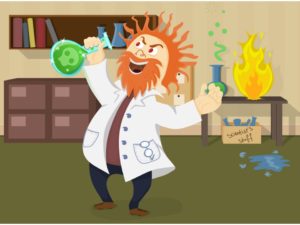One of the focuses of my blog is awareness of the Science, Technology, Engineering and Mathematics fields. If you’re in a STEM and are working in a laboratory setting, it’s particularly important for novices to understand how to properly conduct one’s self. The following contributed post is entitled, Don’t Be A Mad Scientist: Avoid These Stupid Lab Mistakes.
* * *

(image)
It doesn’t matter which of the basic sciences you are working in; common sense needs to be your number one priority. Science is about creating answers, not mistakes, but if in your folly you make any of those stupid lab blunders, then you are going to create both chaos to your experiments and put yourself at risk of accident and injury. Yikes!
Mistake #1: Mislabeling something
You’re not an idiot; you have trained in your field, so you will know what most things are. You know your rotary vane pumps from your boosters and compressors. But then again, you may have lacked concentration and mislabelled a test tube, or you may not quite know the difference from a certain chemical from another, especially if they look the same. The wrong combination could result in something calamitous, be that a failed experiment, or something far more explosive. Therefore, don’t assume you know what something is without doing some research first, and for goodness sake, concentrate when you’re labelling, for the sake of everybody working with you.
Mistake #2: Not sticking to fire safety protocol
Following proper fire safety protocol is one of the most important things you can do in the lab to stay safe. To that end, you must know the correct protocols and act on them in case of a fire. Indeed, as labs are such specific contexts and the risk of fire is often increased it’s a good idea to find an expert in fire safety and prevention such as Devin Doyle Newport Beach to work with. Such an expert can then provide tailored advice to your particular needs and ensure your fire risk is kept as low as possible.
Mistake #3: Using faulty equipment
You aren’t going to get the desired results if your equipment isn’t up to scratch. Not only can you create a chemical disaster if something is leaking where it shouldn’t be, but you will be forced to start your experiment again if you have used something as simple as an uncalibrated pipette. Always check your equipment beforehand, and if you need to buy something new, or if you need to call on the expertise of someone like this pipette repair service, then do so.
Mistake #4: Wearing your lab coat out of the lab
Who knows what nasty stuff has gathered on your lab coat during your experiments! The last thing you want to do is take that troublesome gook out of the lab and into the cafeteria or the outside world, as you may cause significant harm to another. Remember to wash your coat too, no matter how much you like the pretty colours that have accumulated!
Mistake #5: Not wearing your protective gear
You are dealing with acids, chemicals, and other toxic substances. You are touching them, surrounding yourself with them, and bearing your beady eyes down upon them. We know we shouldn’t have to say this, but we will anyway. Always wear your safety gear! Letting any kind of toxic formula get into your eyes, onto your skin, or into your nasal passageway, could be tantamount to personal disaster. Make it a rule to have what you need to hand as you enter the lab, so you don’t forget to put on what you need to be wearing.
Mistake #6: Having your lunch in the science lab
You may as well be swigging from a test tube! There is a place to eat your lunch, and that’s nowhere near your workbench. In fact, you should be out of the lab and at your designated eating area. You don’t want to poison yourself by letting even the smallest amount of a chemical touch your food, even if you have washed your hands like a good boy after taking off your gloves. And who knows what might happen if you let any of your cheese sandwich fall into your experiment. You could destroy the world! Or, at the very least, your experiment!!
In all things, practice common sense. You might look like a mad scientist, but that doesn’t mean you have to behave like one! Take care if you are in the lab today, and thanks for reading.
